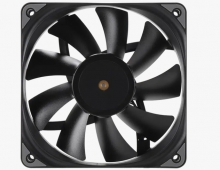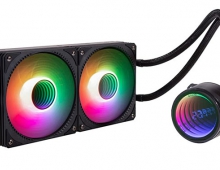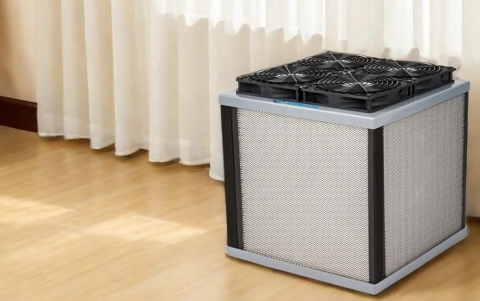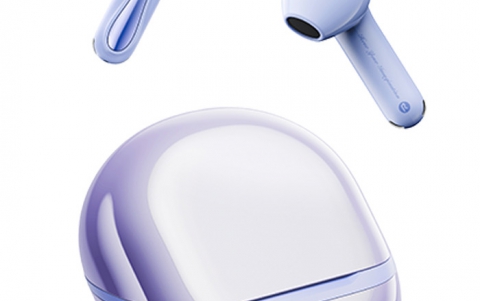Gelid HeatPhase Ultra
3. Tests
In order to test the Gelid HeatPhase Ultra we used the following test system:
- CPU: AMD Ryzen 9 7950X
- CPU Cooler: be quiet! Dark Rock Elite (stock fans)
- Thermal compound: Noctua NH-T1
- Case: StreaCom BC1 V2 Bench Table
- Motherboard: Asus ProArt X670E-CREATOR WIFI with 1807 BIOS
- Memory: 2x24GB Crucial DDR5-6000MHz (EXPO Profile)
- PSU: be quiet! Dark Pro 13 1300Watt
- Main Storage: Samsung 980Pro 1TB
- VGA: MSI GeForce RTX 4090 SUPRIM X 24G
- Operating system: Windows 11 x64 + latest motherboard/AMD chipset drivers installed (DirectStorage enabled drive)
- Software: OCCT Enterprise Edition (2 sec interval monitor)
- Ambient room temperature ~ 23 Celsius (with AC climate control) - Environment Temperature measurements: Precision Gold N09AQ Envirometer Meter
Before starting our tests, we performed via the Asus Armoury Crate Fan Expert Software an optimization of the installed CPU fan in order to get optimum fan curve/speeds. All test results were performed via a climate controller room at ~23 Celsius at the same position of the room, with the exact same conditions.

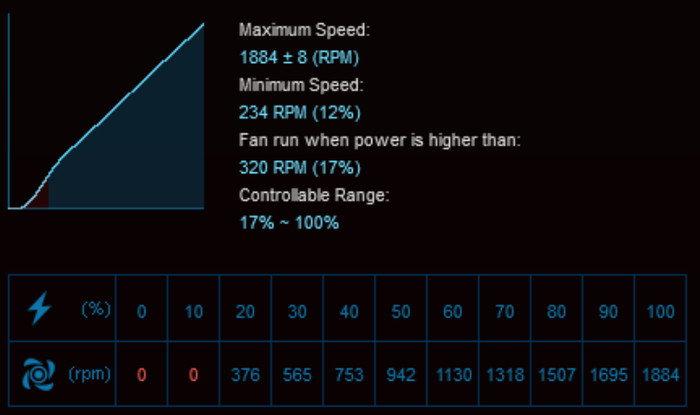
We performed four tests depending on the CPU TDP load that can be set under Bios-> AI Tweaker-> Precision Boost Overdrive->AMD Eco Mode->
- cTDP 65Watt (real 90Watt)
- cTDP 105Watt (real 145watt)
- cTDP 170Watt (normal AMD 7950X operating)
- cTDP 222Watt (via PBO at auto)
while we set the following voltages for all tests.
- CPU Core Voltage: Auto
- CPU SOC Voltage: 1.25V
- CPU VDDIO / MC Voltage: Auto
- Misc Voltage: 1.10V
At the OCCT software, we performed the Stability Test->CPU Test 15mins duration with various settings to get the maximum thermal production from the AMD 7950X.
Tests Disclaimer: Despite placing CPU voltages manually, the motherboard may supply the CPU with slightly different voltages, resulting in some cases higher temperatures that also result in higher working temperatures. Your conclusions should be an overall judgment for both Average temperatures and maximum working frequencies. Our results are valid with the above test system and using other variations may result in different results.
Starting from the low 65watt AMD Eco TDP, we used the following OCCT settings
- Instruction Set: AVX2
- Data Set: Large
- Mode: Normal
- Load Type: Variable
- Thread Settings: Auto
The Gelid HeatPhase Ultra did manage to get a lower working temperature, even by a small margin compared with other Gelid thermal paste products and other thermal pads.

While CPU temperature is one indication, we also want our CPU to perform as high as it can, which will result in the best overall performance. At 65watt TDP, the Gelid Heatphase Ultra pad did get the highest average CPU effective clocks.

At the 105watt AMD Eco TDP setting, we used the following OCCT settings
- Instruction Set: AVX2
- Data Set: Large
- Mode: Normal
- Load Type: Variable
- Thread Settings: Auto
The Gelid HeatPhase Ultra performed very well again at this test, however it performs even better as time passes, that was confirmed, after re-running all tests a second day to confirm our suspicion, since most phase change thermal pads do need a "break" time period to perform best. At the 105-watt AMD Eco TDP, we started to see some serious changes in performance compared with other thermal pads and Gelid thermal paste.

While lower temperatures were satisfactory, on the second day we didn't get the highest possible CPU frequency.

At the 170watt AMD TDP setting (normal AMD 7950X running TDP), we used the following OCCT settings
- Instruction Set: SSE
- Data Set: Large
- Mode: Normal
- Load Type: Variable
- Thread Settings: Auto
When the AMD 7950X is running at full (normal) TDP, the Gelid HeatPhase Ultra did manage to get very close to a proven thermal paste from Noctua NH-H1, especially when running tests the second day in a row.
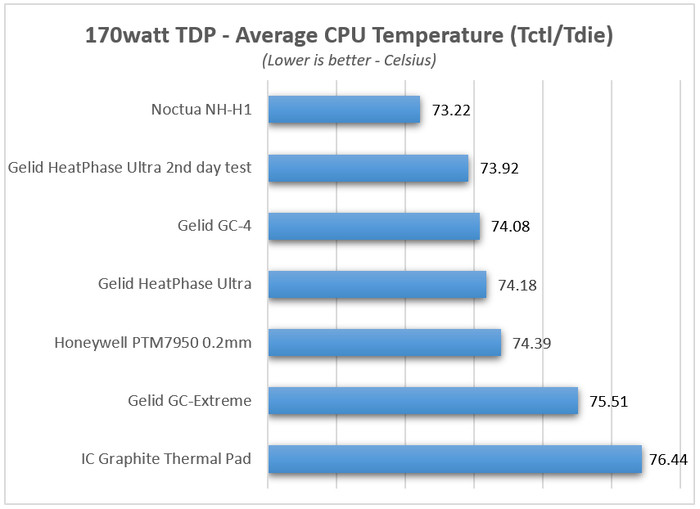
The average effective clocks at this TDP were very close to the top

A third index we decided to present is the CPU Temp / CPU Package power, to give a more objective index and try to eliminate the voltage spikes that might occur during our testing. The Gelid HeatPhase Ultra performs very well and is close to the Noctua NH-H1.
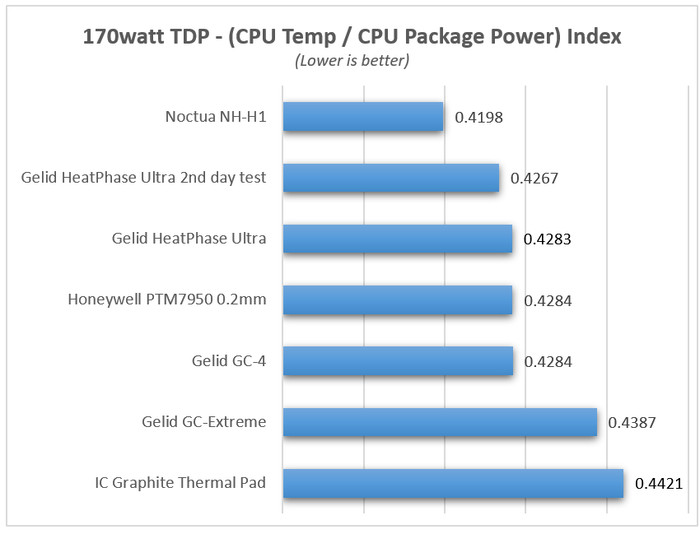
The 222watt TDP setting for the AMD 7950X comes when setting OCCT CPU test with the following rules:
- Instruction Set: SSE
- Data Set: Small
- Mode: Extreme
- Load Type: Steady
- Thread Settings: Auto
At this test, the AMD 7950X produces a high amount of heat, and the Gelid HeatPhase Ultra, manages to get close to the top, especially on the 2nd day tests.

At the average effective CPU clocks test, we found the Gelid HeatPhase Ultra to perform close to the top.

At the CPU Temp / CPU Package power index, the Gelid HeatPhase Ultra comes very close to the top with very good performance.


